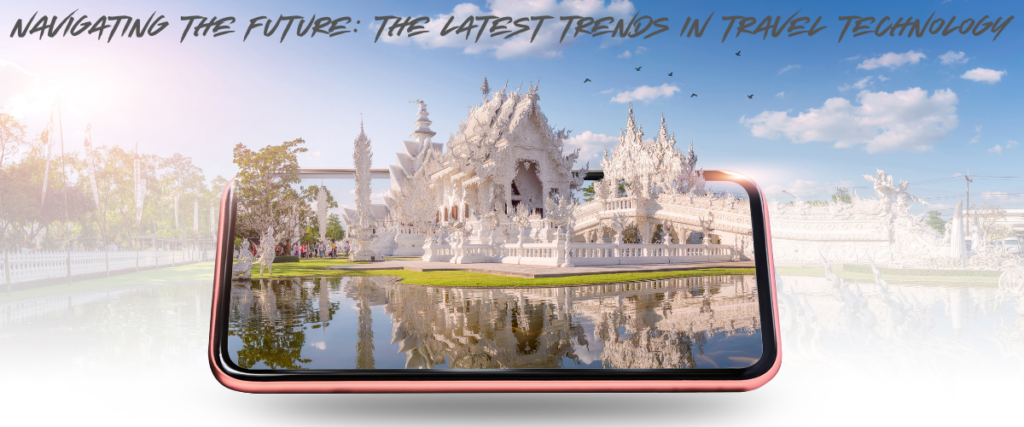The travel industry has been radically transformed from the days when people booked paper tickets and relied on physical guidebooks — all at the feet of the relentless march of technology. The travel revolution happening now combines cutting-edge innovations that improve the travel experience with technologies that upend the way tourism works. Therein lies the future of travel, whether through personalised itineraries or seamless, contactless journeys — all being written in code. Now, let us dive into the trends that are significantly altering the travel tech landscape.
1. The Rise of AI and Personalization:
Artificial intelligence (AI) is no longer an idea of the future—it is a current reality that profoundly impacts travel. AI-based chatbots deliver instant customer support, answering questions and resolving issues instantly. Recommendation engines craft customised itineraries, proposing where to go, what to do, and where to eat based on where you have been and what you like.
- Dynamic Pricing and Predictive Analytics: AI algorithms analyse vast datasets, including flight prices, hotel occupancy rates, and seasonal trends, to predict future pricing fluctuations. It allows travellers to snag the best deals and travel companies to optimise their revenue.
- Personalised Experiences: AI is enabling hyper-personalisation. Imagine a travel app that anticipates your needs, suggests recreations based on your interests, and even adjusts your hotel room temperature based on your preferences. This level of customisation is becoming increasingly attainable.
- Language Translation: AI-powered translation tools help remove language barriers, allowing travellers to communicate seamlessly in foreign countries. Real-time translation apps and devices are making international travel more accessible and enjoyable.
2. Contactless Travel and Biometrics:
The COVID-19 pandemic propels the travel industry toward a contactless future. From contactless check-ins to biometric identification and payments, the focus is on minimising physical interaction and raising hygiene levels.
- Biometric Authentication: Fingerprint scanning and facial recognition streamline airport security and border control processes. Biometric boarding passes eliminate the need for physical documents, reduce queues, and enhance efficiency.
- Mobile Check-in and Digital Keys: Mobile apps enable travellers to check in online and choose a seat. Boarding passes and hotel rooms can also be accessed with digital keys via mobile apps. It eliminates the need for physical keys and limits touch to common surfaces.
- Contactless Payments: Digital wallets and QR code payments are becoming the norm, reducing the reliance on cash and physical cards. It not only enhances hygiene but also simplifies transactions.
3. Augmented Reality (AR) and Virtual Reality (VR):
Virtual Reality (VR) and Augmented Reality (AR) technologies are reshaping how travellers experience destinations. AR apps layer digital information onto the real world, offering interactive maps, historical insights, and real-time translations. VR provides a way to take virtual tours of destinations, allowing potential travellers to explore places before they even set foot there.
- Virtual Tours and Previews: VR allows travellers to experience destinations virtually, enabling them to make informed decisions about where to travel. It is particularly beneficial for planning complex itineraries or exploring remote locations.
- Interactive Guides and Historical Insights: AR apps provide interactive guides at historical sites and museums, overlaying digital information onto physical artifacts. It enhances the learning experience and makes history more engaging.
- Navigation and Wayfinding: AR navigation apps provide real-time directions and points of interest, simplifying navigation in unfamiliar environments.
4. The Internet of Things (IoT) and Smart Travel:
The IoT connects various devices and systems, creating a network of smart travel experiences. Smart luggage, connected hotel rooms, and intelligent transportation systems are all becoming increasingly prevalent.
- Smart Luggage: Luggage equipped with GPS trackers, weight sensors, and charging ports provides travellers peace of mind and convenience.
- Connected Hotel Rooms: Hotel rooms with smart thermostats, lighting systems, and entertainment options enhance the guest experience. Voice assistants allow guests to control various aspects of their room with simple voice commands.
- Intelligent Transportation Systems: Smart traffic management systems, connected vehicles, and real-time transportation updates improve travel efficiency and safety.
5. Sustainable Travel Technology:
As concerns about climate change grow, the travel industry is increasingly focusing on sustainability. Technology is crucial in reducing travel\’s environmental impact.
- Carbon Footprint Tracking and Offsetting: Apps and platforms allow travellers to track their carbon footprint and offset emissions by supporting sustainable projects.
- Electric Vehicles and Sustainable Transportation: Electric vehicles, high-speed rail, and other sustainable transportation options are becoming more prevalent. Apps provide information on electric vehicle charging stations and sustainable transportation routes.
- Sustainable Hotel Practices: Hotels are adopting energy-efficient technologies, reducing waste, and implementing sustainable practices. Technology helps monitor and optimise energy and water usage.
- Data analytics for efficient routing: Airlines increasingly use data analytics to optimise flight routes and reduce fuel consumption.
6. Blockchain and Decentralised Travel:
Blockchain technology offers new possibilities for the travel industry, including secure data storage, transparent transactions, and decentralised marketplaces.
- Secure Data Storage: Blockchain provides a secure and transparent way to store and manage travel data, such as passport information and booking details.
- Decentralised Booking Platforms: Blockchain-based booking platforms connect travellers directly with service providers, eliminating the need for intermediaries and reducing transaction fees.
- Loyalty Programs and Digital Tokens: Blockchain enables the creation of decentralised loyalty programs and digital tokens, allowing travellers to earn and redeem rewards across multiple platforms.
7. 5G and Enhanced Connectivity:
The rollout of 5G networks provides faster and more reliable internet connectivity, enhancing the travel experience in numerous ways.
- Seamless Streaming and Entertainment: 5G enables seamless high-definition video and audio streaming, enhancing in-flight and on-the-go entertainment.
- Real-time Communication and Collaboration: 5G facilitates real-time communication and collaboration, allowing travellers to stay connected with friends, family, and colleagues.
- Enhanced Navigation and Location Services: 5G provides more accurate and reliable location services, enhancing navigation and wayfinding.
Conclusion:
The travel sector has already embarked on a tech-driven renaissance, and the cornerstones of this transformation are AI, contactless technologies, AR/VR, IoT and much more. Did you know that these trends are improving the travel experience and changing the tourism landscape? With technology advancing at such an expeditious pace, the future of travel will no doubt look even more exciting, with travel becoming more personalised, seamless and sustainable. The future of travelling looks bright, and technology is paving the way.
Disclaimer:
The information provided in this blog is for common knowledge and informational purposes only and does not constitute professional guidance. While we strive to provide accurate and up-to-date information, the travel technology landscape constantly evolves. Therefore, we recommend conducting your own research and consulting with relevant experts before making any travel-related decisions. The author is not responsible for any omissions or errors in the content of this blog. Finally, technology is constantly changing. Therefore, some of the specific technologies mentioned may be replaced or modified in the future.


